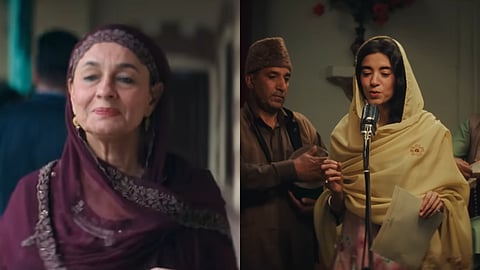Songs of Paradise Movie Review: Saba Azad and Soni Razdan show spark in an otherwise dry biographical drama
Songs of Paradise Movie Review(2 / 5)
Songs of Paradise Movie Review: A woman in Kashmir rises to become the first female singer on radio in the 1950s. It is a story that lends itself multiple meanings. It is also naturally poetic, with the Kashmiri songs that she hums to herself carrying a desire for her to be more in a world that doesn’t allow her to dream. Yet, when filmmaker Danish Renzu does a cinematic adaptation of the extraordinary life of the singer Raj Begum, it doesn’t quite hold up. There are no efforts to go deeper into her life. The focus is more on knowing than feeling. Even the magnetic pull of her piercing songs feels out of place. The metaphors crumble, the poetry is lost. What follows is a generic show of indifference.
The story beats carry a dated sensibility where there is little space for nuance. We meet Zeba Akhtar (Soni Razdan) when she is already an ageing, veteran singer who gets a repeating nightmare of fire breaking out at her performance. A young musician, played by Taaruk Raina, wants to write a thesis about her life and music and requests her for an interview. Zeba ignores him at first but agrees to speak to him later when she hears him humming one of her songs, in an awkwardly shot scene. Zeba starts narrating her life story and we cut back to 1954 where her younger version is played by Saba Azad. Her kind, supporting father does tailoring to make a living and wants to open his own shop soon, which irks her mother, played by Sheeba Chadha, who is ashamed of his occupation and just wants to marry her off to lessen the burden.
Directed by: Danish Renzu
Starring: Soni Razdan, Saba Azad, Zain Khan Durrani, Sheeba Chadha, Taaruk Raina, Shishir Sharma, and Lillete Dubey
Streamer: Prime Video
Rating: 2 stars
Danish’s screenplay makes a living caricature of the mother who is always shown to be angry and conservative with little sign of humanity left. The conversation scenes between Zeba and her mother play out in an overly dramatised manner with Sheeba becoming an extreme end of the character, straight out of a TV soap. It is all helplessly ridden with cliches. When Zeba expresses her hesitation to her music teacher about continuing to sing, he responds with the line, “Ab ye aawaz qaid nahi reh sakti (Now this voice cannot be caged),” which lands more like a forced slogan than a genuine sentiment.
The film is also shot with a pleasing colour palette that captures Kashmir like we have seen before in tourism ads with some intricate wall designs and some brief glimpses into the quaint, old neighbourhood of Srinagar. The sense of geography doesn’t quite add any layers to the story and the location of Kashmir begins to feel accidental to the plot. In a story about a woman’s quest to make her mark in a highly patriarchal setup, the visuals are surprisingly polished, lacking the gritty undertone which would have helped in flourishing the themes better. Much of it seems too ‘feel-good’ to be true.
Songs of Paradise ironically lacks a coherent voice in its filmmaking. It doesn’t seem as heavily researched nor as authentically realised. The film merely carries a scent of the artist, scarcely building on to her persona as we are constantly told of the brilliance of her voice but never shown the essence of her art. Soni Razdan and Saba Azad manage to hold their guard even when the screenplay doesn’t have much complexity to offer. They complement each other well, playing different versions of the same person across different timelines.
However, the performances are not enough to keep the film afloat. By the time it ends, we have known just about a little bit more about Raj Begum than what was already conveyed through the trailer. The best way to often understand a popular figure is to see them when they weren’t as famous. In Songs of Paradise, Zeba shows little growth. She remains almost unchanged from the moment we first meet her to when she eventually becomes a household name. We don’t know what made her sing in the first place or why her mother is so tough. We don’t ever see Zeba for the human she was as the film never stops looking at her with wonder. What about her worries and desires? What about her inner turmoil?

